When I saw The Force Awakens and Rogue One, I tried to figure out what made them so much more compelling to me that the prequel trilogy. After all, I’d gone into The Phantom Menace incredibly excited to see another chapter in the Star Wars story, only to be disappointed by each film, but Force Awakens and Rogue One both struck me as worthy successors to the original trilogy.
The more I’ve thought about it, the more I think both films honor a tradition from the Original Trilogy: in the midst of an often cartoonish space opera, it’s the moments of heroic vulnerability—not moments of action—that define the series. This is the emotional undercurrent that kept the trilogy so vital, and the fact that the two latest films embrace this theme is part of their success.
Spoilers for The Force Awakens and Rogue One to follow.
In A New Hope, the moment of vulnerability is obvious, and it sets the tone for the rest of the series. Luke, against all the advice of the Rebellion, and presumably the screaming of his conscious mind, turns his targeting equipment off and opens himself up to the Force. This builds on Obi-Wan’s earlier assertion that he’d made his first step into a larger world when he first tried to practice blind. It seems odd to think about it, but these are the only two times we see Luke tapping into the Force in the first film—his few minutes of practice on the Falcon, and then the shot he takes at the Death Star. Everything in between those points are standard issue action movie behavior: rescue the princess, escape the stormtroopers, watch your mentor die, shoot enemies you can see with guns that work logically… But suddenly Luke throws all of that out the window to listen to a ghost and open himself up not just to the Force, but to failure.
If the Force doesn’t guide him, and he misses, the whole mission has failed and the Rebellion is probably defeated. If turning his equipment off makes him more vulnerable to attack from Vader, and he’s killed, well, there goes the adventure he’s just set out on, and the larger world he’s only begun to see. Either way this is the defining moment of his existence, and sends him down a path of his own choosing.
Earlier, Luke refused Obi-Wan’s Call to Adventure, and only decided to join him on the trip to Alderaan after Owen and Beru are murdered. He’s takes the chance to learn about the Force from Obi-Wan, but what were his other options? Stay, and keep on moisture-farming? Join the Empire he now hates, just to get away from Tatooine? His only skill is flying, and he imprints on Obi-Wan like a well-feathered duckling because this is literally the first time he’s been able to talk about his father without being shushed. He’s reactionary for most of the film, forced into corners and making the best of bad situations. True, he does choose to rescue Leia, but even then he comes to that decision only after he and his companions are forcibly taken on board the Star Destroyer. Finally, at the end of the film, in the privacy of his X-Wing, he is faced with a definitive choice—trust in the Force, and Ben’s teaching, or use the tech he’s been trained with, and the skill we already know he has. He’s a good pilot, he’s a good shot—he may stand a good chance of destroying the Death Star on his own. But he chooses to drop his defenses and let the Force in. This is the first decision he makes as a Jedi.
In Empire Strikes Back, Leia gets her own big moment of vulnerability, putting aside her usual matter-of-fact demeanor and throwing herself into a moment. She tells Han she loves him, even though she doesn’t have to. He’s about to be frozen, and she has no idea how much longer she has to live. Vader’s promises can’t be trusted so she must know that if she’s loaded onto his ship she most likely isn’t coming off of it again. She could keep up a brave face, as Han does—she could try to be cool. Instead, she chooses to tell Han the truth to give him something to hold on to, and in return he says “I know”—both to stay strong himself, and possibly, to give her an out. If she lives and he doesn’t, she might be able to move on from the scruffy-looking nerf-herder who couldn’t ever drop the facade.
Han for the record, is never vulnerable in the Original Trilogy. Even when he’s blinded from carbonite sickness, he’s still cracking jokes, teasing Luke, and trying to talk his way out of death. There is never a moment of real fear or pain, and he just rolls with everything, even the fact that Lando—who was in the process of betraying him the last time he was conscious—is inexplicably helping with the rescue. (He’s so cool with it that he in turn helps rescue Lando from the Sarlaac.)
But Leia? Leia opens herself up to her feelings for Han, and, as we now know from The Force Awakens, this relationship defines a large part of her later life. In the new canon, her time with Han may have had good moments, but their son’s fall to the Dark Side has largely overshadowed those good memories. She is now the mother of a wannabe-Vader, and the former partner of a smuggler whose cons aren’t working anymore. Her declaration of love has shaped who she is 30 years down the line.
Return of the Jedi makes a very interesting choice, one that, for me at least, defines the Original Trilogy: Instead of culminating with a straightforward battle between “good” (Luke) and “evil” (Vader), the film doubles down on Luke’s trust in the Force. By going to Vader and refusing to fight, he offers himself up as a sacrifice to his father’s better nature. And, to the film’s credit, Luke’s struggle with the Force is taken completely seriously. He lashes out at the Emperor when it becomes clear that his friends are being massacred. He attacks Vader when he realizes that he’s given Leia away. Twice he falters, and almost gives in to violence. But each time he pulls himself back, which makes the final scene all the more powerful.
This stands in stark contrast to the climax of The Empire Strikes Back. When Vader cuts his hand off and asks him to join the Dark Side, Luke chooses to drop to what seems to be certain death. But there is plenty of ambiguity in this moment. Is Luke rejecting the Dark Side? Is he rejecting his father’s true identity? Is he allowing the Force to guide him, or is he acting on his emotions? That moment (which is my favorite in the entire series) is open to interpretation. Luke’s choice to spare Vader in RotJ is not.
After fighting Vader to a standstill, defeating his father in a battle, he stops short. Luke has the upper hand; he could kill Vader in a moment, and maybe even have enough strength to at least wound the Emperor. Or he could turn to the Dark Side, as Mark Hamill himself thought he should (and as I thought he would, the first time I watched the film). But he rejects both of those choices, too. He stops fighting, refuses to kill his father, and, in the ultimate moment of neck-baring, throws his lightsaber away. This isn’t choosing death, this is choosing torture, this is choosing to watch all of his friends die, this is choosing an utter nightmare, all so that he can prove to his father, and to himself, that the Light Side of the Force is as strong as the Dark. This changes the course of Anakin’s life, and ultimately the galaxy’s, as Vader turns on Palpatine.
Which leads me to consider Anakin. Does he ever have such a moment?
If I wanted to, I could cite endless reasons why the prequels don’t really work as films. (As visual art? As worldbuilding? Heck yeah. Just not as film.) But the real thing is simply that due to a combination of on-the-nose dialogue and stiff acting, there are no moments of true vulnerability. Obi Wan is the Han for these movies, throwing out quips left and right. Anakin is the romantic hero, and Padme is the sensible senator who wants to do right by her people. None of them have the moment of true vulnerability that would have given the films a heart. Padme should, since she becomes pregnant and then has to face Anakin’s turn to the Dark Side, but since they never have a believable connection begin with, there’s little emotion when she leaves him. Anakin has a few opportunities: leaving his mother, returning to find her murdered, learning Palpatine’s true identity, and finally, the most obvious one, the climatic fight with Obi Wan.
None of these moments land because everyone involved states the obvious at all times. There is no subtext, there are no “I love you” / “I know”-style twists. People say what they mean. Anakin screams “I hate you!” at Obi-Wan, but imagine the movie where he says he loves Obi-Wan in that moment instead. The movie where Padme turns cold, and buries her love, and leaves Anakin without tears, but opens up to Obi-Wan later. The movie where Padme lives, but has to give her children up for their own safety, and live knowing that Vader could come for her at any time.
The closest the prequels come to that real moment is Obi Wan screaming that Anakin was the Chosen One—but even then Obi-Wan has the high ground, both physically and emotionally. There’s no danger, and the emotional impact is lost in all that lava.
Han finally gets his moment in The Force Awakens. He kept himself cool (uh, no pun intended) during the freezing process; he never lost his witty exterior throughout the dangers of Stormtroopers and human-flesh-craving Ewoks; and even when he was faced with Leia loving Luke, he kept it together—he simply offered to stay out of their way so they could be happy together. We thought he’d made it through the series with his cool exterior intact. An entire generation of SW fans grew up and had kids with only this Han in their minds: iconic vest, an endless supply of quips, last minute heroism, that shrug when he cons the Empire into surrendering to him. It’s a testament to his coolness that the Han Shot First/Shot Solo argument even existed. People were so angry about the idea of their hero being outgunned that it became the focal point of the backlash against George Lucas.
The Force Awakens throws that away like an unneeded weapon. Han is older, broken, still trying to con people, still trying to be slick, but he can’t really do it the way he used to. And no, it’s not because he’s older, it’s because he’s suffered now. He and Leia may well have drifted apart anyway—their relationship was always volatile even in the first three films. But losing Ben? Waking up every morning and knowing that your son rejected you, and chose a life of darkness? There’s no quip that can fix that. So here, thirty years later, we finally get Han’s moment: not with Leia but with their son.
But it begins sooner than that, I think. As soon as Leia asks Han to “go get our son” the look in Han’s eyes tells us that he knows he’s a dead man. When I watched the film the first time, I realized then that I was about to watch this character die, and I actually missed most of Rey’s rescue because I was waiting. This was good, the way the movie warned us, almost subliminally, that we were about to see something terrible. It made it easier, to know along with Han. Watching it a second time I was able to pick out the nuances. He tells Chewie to go up to set the charges on the upper levels of the Starkiller Base, which gets him out of the way. He also gives him the detonator, which means their plan still has a chance even if Han’s not there to see it through. He can trust Chewie. The kids are safely outside. Leia’s far away—she’s not there to see him fail, or rise to the challenge of facing Ben. Even knowing all of this, Han considers bolting. When he sees Ben on the catwalk, you can see it in his face. He could run, blow the place, kill his son, and deal with the grief for the rest of his life… but at least he’d have a life. But of course he doesn’t run. He lives in a universe where heroism, true heroism, is defined by vulnerability. By trust. And it’s his turn to be the hero now, not Finn’s or Rey’s.
When he faces Ben, he never reaches for weaponry. For all that we mock Emo Kylo Ren (and believe me, we do) he’s still a Force-user, trained by Luke Skywalker. We’ve seen him probe people’s minds and stop blaster shots in mid-air. Han is totally outmatched here. But the point is he doesn’t even try to defend himself. In fact, he stands so close to his son that he doesn’t leave room to draw a blaster even if he wants to. And I would argue that he isn’t trying to talk his way out of anything, he isn’t trying to be charming. The words he uses on Ben are not a line. He’s just pleading with his son to come back, and when he son opens up to him, he replies that he’ll do “anything” for him. And it’s that, that “everything”, knowing that he’s talking to a murderer but only seeing his child, that is his real moment of heroism. It defines his life, becomes the moment of his death, and defines where the universe will go from here. In that moment, Han becomes a martyr, Kylo Ren earns the hatred of Chewbacca, Finn, and Rey, and the Star Wars Universe gains its most hated villain.
After we all saw the film the first time, my friends and I debated whether Kylo Ren could be redeemed. How can anyone come back from that? How could anyone be forgiven for murdering someone we’ve all loved for decades? This conversation eventually spun into the original version of this post: is there an act of vulnerability meaningful enough to redeem Kylo Ren? Will it fall to him to create the emotional fulcrum of The Last Jedi?
I was intrigued to see that Rogue One sidestepped this throughline, in ways that I thought simultaneously strengthened and undercut the film. Jyn Erso never experiences such a moment of vulnerability as I’ve defined it here. This allows her to remain tough and taciturn, which is a welcome change from most female characters who are revealed to have a mushy center so they can be considered “likable.” At the same time, though, this means the movie misses a chance to give Jyn more depth. As it is, the character is fairly flat compared with other Star Wars leads.
Bodhi Rook could have had the vulnerability arc, since he’s the one who defects with the Death Star plans and arguably puts himself at highest risk, but he’s also subjected to the Bor Gullet’s mind probing tentacles, seems to lose his sanity, and then, gradually, seems to get at least some of his memory and personality back—which completely undercuts his character arc as a defector. We never learn why he chose to leave (my assumption is that his reaction to Mads Mikkelson was the same as mine would be: swoon and do anything he asks of you), or what this sacrifice meant to him.
The person who does seem to have a moment of vulnerability is Chirrut Îmwe, and it’s in his character that the film makes a really interesting choice.
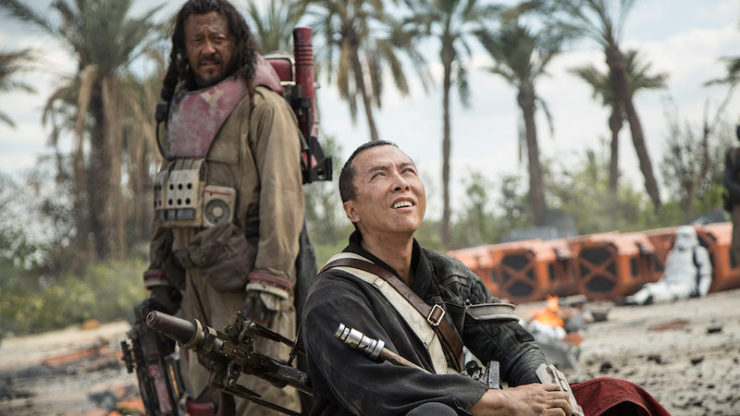
Chirrut is essentially the Star Wars Universe’s own Zatoichi the Blind Swordsman. He is a monk, one of the Guardians of the Whills, and believes in the Force in a more overtly spiritual way than any of the Jedi we’ve seen, because he’s not a trained Jedi who can tap into it and feel it flowing through him—he simply believes it’s there. At the end when he decides to walk into blaster fire to flip the transmitter switch, he has no reason to think that the Force will protect him in any way, and he has no way to defend himself from the people shooting at him. He just trudges out there, reciting his mantra of “I am one with the Force, the Force is with me,” and trusts that he’ll make it to the terminal. And yes, he has Baze Malbus there for backup, but he also knows that Baze can’t possibly fend off the number of shots that are being fired. He knows this is probably the end of him, but he chooses to make himself vulnerable to the Force nevertheless.
In this moment Chirrut taps into the same negation of self that Luke did in the first Death Star attack, and again when he faced his father in Return of the Jedi. While the rest of the characters are in an ensemble war movie (and act accordingly) Chirrut seems to be on his own journey. In the same way that Luke sidestepped the old heroic arc of killing and replacing his father, Chirrut chooses a key moment to reject violence and try a different path, which is what leads to the Rebellion’s success in getting the Death Star plans. Obviously Rogue One is a standalone film, but could this point toward a larger understanding of heroism throughout the Star Wars films?
An earlier version of this article was published in January 2016.
Leah Schnelbach experienced her own moment of vulnerability when Chirrut collapsed into Baze’s arms, and she hasn’t recovered yet. Come weep with her on Twitter!










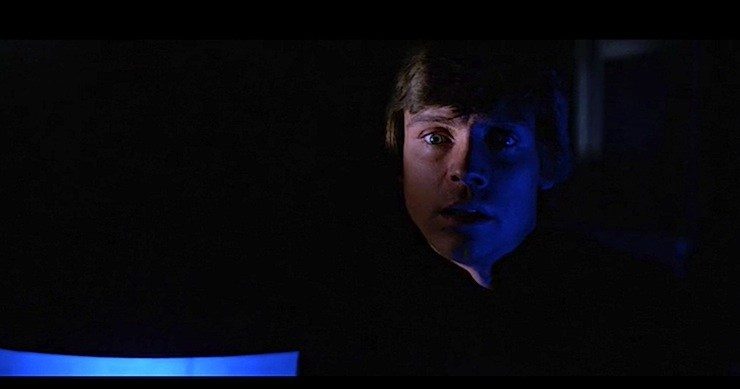
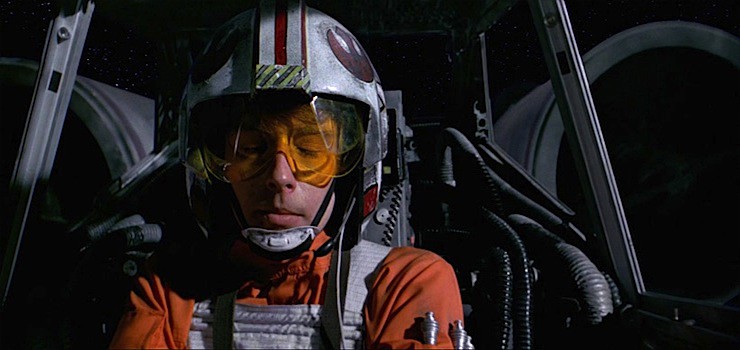
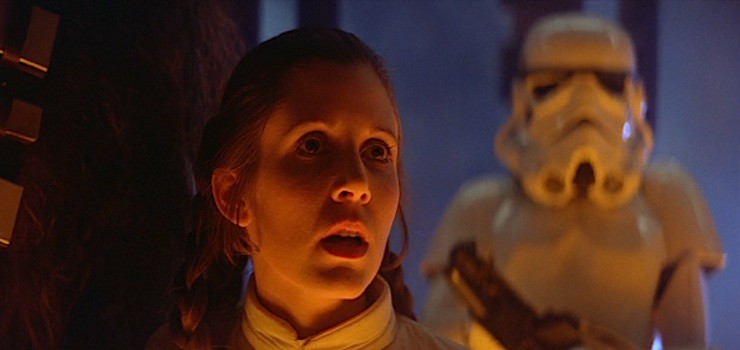
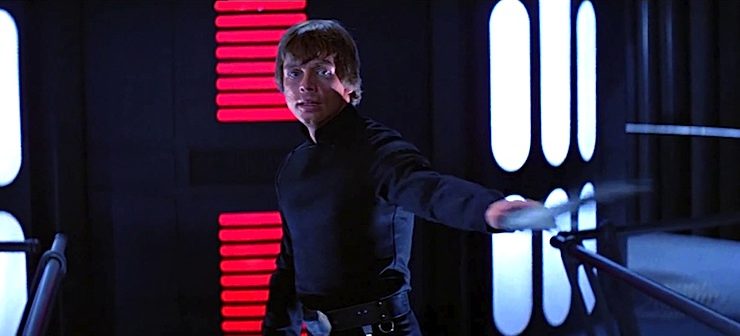
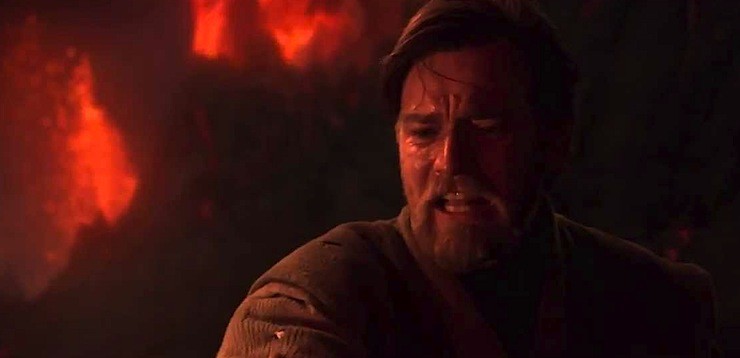
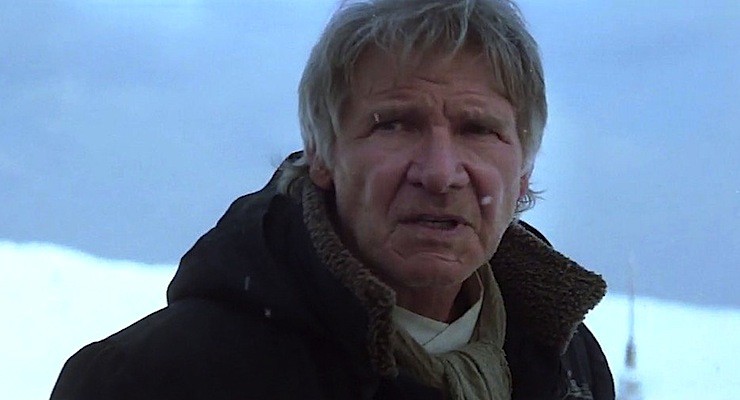
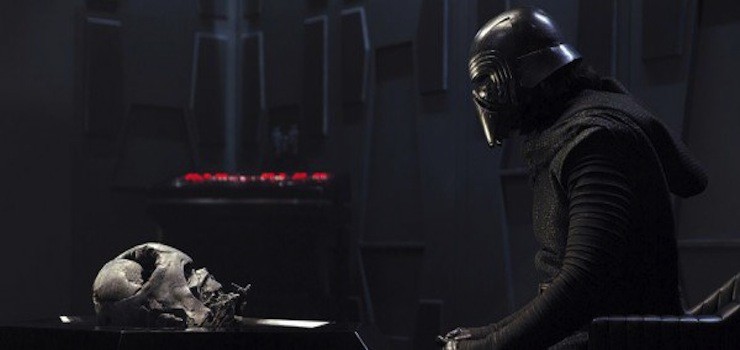
I feel your being very picky in your review of the prequels feels moments, they are flawed but have Many good scenes.
What about Yoda’s pain as he feels his Jedi order die? in there final fight after murdering a whole lot of children how could you expect a new Sith to admit to love, yet you seem to forget Obi Wan tells Anakin that he loves him, that has the high ground :) that is a powerful scene. There is pain when Qui-gon is killed, you feel that far more than you do at the death of Obi-wan in a new hope. And its hard not to feel sorry for the Wookies at the end of RotS as Yoda effectively apologizes for abandoning them.
In my opinion, Luke choosing not to fight is the thing that makes Star Wars stand out.
You’re completely right about Chirrut Îmwe being a Zatoichi character, I can’t believe I’ve only connected it!
About Rogue One, I rewatched it some days ago and found it less developed than I remember. The characterization is shallow, sadly, I wasn’t convinced by Jyn’s change of heart and Cassian’s trust in her. I feel we needed some scenes in the middle to make it work.
I’m sure I don’t need to tell you that Luke, Han, Chewie, Obi-Wan, and the droids never set foot inside a Star Destroyer in the films. :)
I disagree. The moment she decides to insist on hitting Scarif, that’s when she drops her tough girl act, that’s vulnerability.
And I disagree with Chirrut not being able to feel the Force. He obviously uses it to fight, just not as flashily as a Jedi, because he lacks training, and because he’s using it just to “see”.
@1 – Matt: Agreed. With all due respect, Leah has done this before in her articles, at least the ones about Star Wars. She chooses what helps her premise, and ignores what doesn’t.
Good essay, you hit a lot of good points. Heroism is not built on being free from doubts and fears, it is built on overcoming doubts and fears.
One nit pick; in the original movie, Luke decided to rescue the Princess after he and his friends were forcibly taken aboard the Death Star, not a Star Destroyer.
@1 But those aren’t heroic moments. Yes, Yoda and Obi-wan feel things but they aren’t open to attack or failure in the way that Luke or Leia or Chirrut were. A heroic moment would be Obi-wan leaving himself exposed in an attempt appeal to Anakin’s humanity (which would have echoed Obi-wan’s death and Anakin’s redemption wonderfully) rather than overpowering Anakin.
I agree, generally, with your assessment of the prequels, but I do think that Anakin had a truly vulnerable moment. After he brings his mother’s body back from the raiders, and Padme finds him sitting alone in his grief, he tells her what he just did. That he gave in to his anger, and killed them all. Even the women and children. Being that honest with her showed a great deal of trust. He had now way of knowing how she’d react, if she would look at him differently, run away thinking he was a monster. It wasn’t a heroic moment, but he still could have lost her for it.
Like I said last time this article was published, Han does have his moments of vulnerability in the OT. In Jedi, when he speaks to Leia on Endor just after Luke has spoken to Leia about handing himself over to the Empire and that he and Leia are siblings, Han goes out to speak to Leia (obviously not knowing about the brother/sister thing) and says that he will step aside if she and Luke are to be an item. He is very vulnerable in that moment, and you see him drop all the cocky attitude and see just a man afraid that the girl he likes doesn’t like him back.
@1 and @3 emotional pain is not the same as vulnerability. The prequels have pain but rarely have moments were you put your trust in something greater, like the force, or love, or peace. The Clone Wars did a better job of showing how Asoka did this, but Anakn never did. Anakin always had to have control. He never put his trust in anything but his own power. It’s why he fell.
Arguably the Jedi order fell in the same way, becoming enforcers of one side of the civil war, rather than even trying to negotiate peace largely lead to Palapatine’s rise and the Jedi’s fall.
I would argue that the big one in Rogue One is not chirrut, but Cassian choosing to trust Jyn over his orders. And again ignoring orders to go to Scarif.
I think each of the ‘original’ movies has a mysterious scene at the heart of it that gives those films a power that is a bit missing in the others–the thing that made Star Wars different.
The trench run is a good scene, but in A New Hope the important scene for me is Obi-Wan’s sacrifice. In context it seems so strange and unlike that kind of scene in any other movie. You can justify it that he has to save Luke from Vader, but it’s hard to explain any logic to what he is doing. There is no ticking time bomb that he is delaying for; no door or gate that he is closing. He simply seems to let go and transcend what is going on. Obi-wan’s guidance to Luke at the very end feels like a punctuation mark to this moment.
In Empire, yes, it is Luke’s apparently suicidal leap, which feels more like a fall through the underworld. This is again such a strange scene–in a more traditional movie I would think that Luke would gain some sort of upper hand on Vader, or at least find a way to escape more safely. Instead this feels like a miracle, punctuated by his summoning of Leia.
And in Jedi, the moment is when Luke is on the verge of defeating Vader… and decides not to. There is no plan here; he simply refuses to continue taking part in the violent climax of the film. It would seem more usual for the villain to be defeated by some mistake they made, but Vader is instead inspired by something he sees in Luke.
This sense of mystery is what I find missing among the other films.
Well, we all know it was the Death Star (though it might have been more interesting if it were a Star Destroyer), but did Luke even have any inkling of where Leia was that she’d be in a position to be rescued before being there?
And why do they have a reactor on a prison level anyway?
I think Chirrut did display some force powers during the movie. He shot down an imperial fighter with his bow staff, not by luck, but by focus. Watch the scene again; he willed that shot.
Now that you mention it, yes, this “heroic vulnerability/surrender” makes Star Wars distinctive; a lot of other fantasy lacks this kind of personal setback, and is less satisfying for it. In anime, for example, a common protagonist trajectory is the linear “reluctance, I-want-to-protect-my-friends(*) epiphany, triumphant new magical powers(**).”
The surrender in The Lion, the Witch and the Wardrobe in which Aslan sacrifices himself to the White Witch isn’t quite the same thing, because it’s a Christ allegory and Aslan knows exactly what he’s doing.
(*) The verb “to protect” in Japanese is “mamoru,” which is also a male name. Character name symbology in anime is frequently … not subtle.
(**) Where “magical powers” is sometimes “mecha with soul(***) accepts its operator and unleashes its full capability” or just “deus ex machina unprecedented boost in fighting prowess.”
(***) Some mecha have an AI, others consume the soul of a prior pilot, and the rest simply benefit from the animist viewpoint of Shinto in which everything, including manufactured artifacts, is endowed with kami. Compare the sacrifice of the hero-ship in several of the Yamato movies to Star Trek III.
@8 – BookBarbarian: Agreed on Chirrut/Casian. Chirrut is completely sure of what he’s doing, there is no vulnerability there (except in the literal, physical sense).
@11 – Ragnarredbeard: That too. He seems to have Force powers related to sensing things, but not affecting others (telekinesis) or his own physical capabilities (Force acrobatics, etc).
I think with Chirrut The Force uses him, he doesn’t use the force, he is willing to give control over to The Force. I know that is kind of splitting hairs but I think it is a big difference.
The other big moment of heroic vulnerability in Rogue One belongs to the nameless rebel trooper who, at the last minute with Vader bearing down on him, decides to give up on his own escape and hand over the plans so at least they can get away. A brave choice, giving that pivotal moment not to one of the ensemble leads but to one of the army, showing that even the people the movie doesn’t focus on have a story.
You didn’t realize that when you first heard that Ford had agreed to be in the movie? :)
Very nice essay; you made some good points that I have missed over many, many viewings of these films.
Further to your point re: ROTJ: I saw the film in the packed Ziegfeld Theater in NYC during its 20th anniversary re-release, and the moment when Luke tosses away his light saber after defeating Vader drew the biggest round of applause from the audience, by far (and this was a crowd of easy-applauding, SW-loving geeks). After more than a decade of watching that film, I suddenly realized that that moment was the story’s true climax.
I don’t think I agree that Han falls outside the heroism as vulnerability paradigm in the original trilogy. It’s just that his moment(s) of vulnerability are largely off-screen. His act of vulnerability is joining the Rebellion: for all that he keeps up the gruff exterior, it gradually becomes clear that, when push comes to shove, he’s all in.
His on-screen moments are relatively more subtle. There’s the “I know what I’m doing” line to Chewbacca before the battle of Yavin. There’s his decision to head out looking for Luke on Hoth. But there is also an off-screen transformation that, eventually, leads to him volunteering to lead the landing force at Endor. He doesn’t do that for a reward, or even for personal loyalty to Leia or Luke (which might explain some of his earlier sacrifices). By that point, he’s a leader in an organization, doing what needs to be done for the cause.
For Han, joining a cause (even one he is sympathetic to) requires making himself part of a collective. He has to open himself to trust and to be trusted. It’s antithetical to the instincts and behaviours he initially displays. We don’t see a specific moment where he faces that crisis, but it must happen because we see the result.
And I would argue that, thematically, that’s just as important as the onscreen crises that Luke and Leia face.
Hear, hear, keithrose.